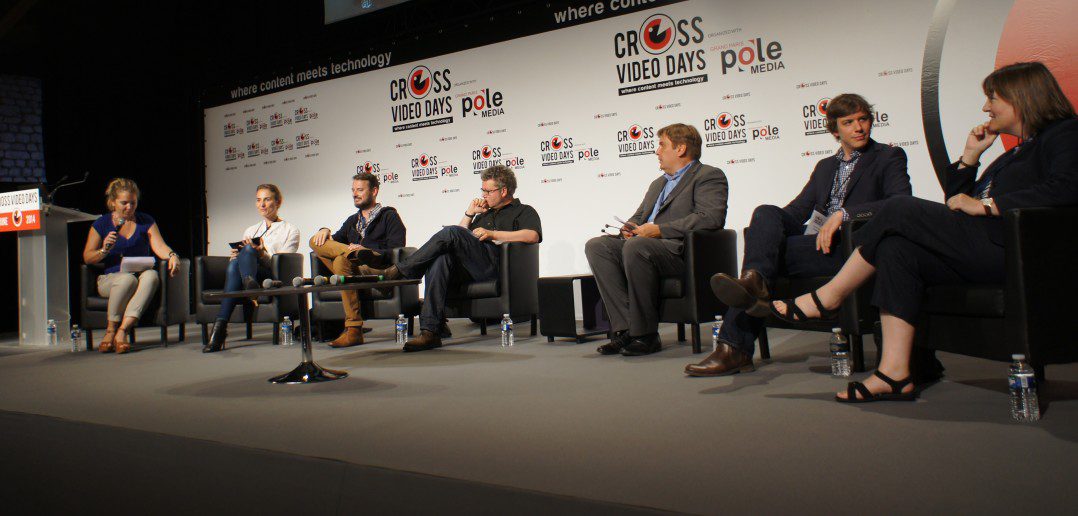Left to right: Amandine Cassi (formerly of Médiamétrie/Eurodata TV), Audrey Brugère (Canal +), Grégoire Olivereau (Eden), Adam Gee (Channel 4), Anders Kappel (DR), Nicolas Gaviola (Brightcove), Amanda Farnsworth (BBC).
What does the future hold for transmedia content? Producers, broadcasters and media analysts tried to answer this question at Cross Video Days 2014, over two days of conferences, showcases, pitches and intense networking.
We are most definitely at the very beginning of a new cycle: all speakers agreed that current projects activated across several platforms require new processes from all players involved. Some of these processes, regardless of the field they affect — production, distribution, etc. — are yet to be refined and implemented.
Two panels inparticular reflected the notion of a grey zone in which no one really knows where the traps and opportunities are; the transmedia world remains a relatively unexplored territory.
“When TV goes digital” featured speakers from various countries and broadcasters, all gathered to assess the impact of internet broadcasting and online interactivity on their respective teams. Anders Kappel (Danish Broadcasting Corp.), Adam Gee (Channel 4), Amanda Farnsworth (BBC), Nicolas Gaviola (Brightcove), Grégoire Olivereau (of production company Eden) and Audrey Brugère (Canal +), in this panel moderated by Amandine Cassi (formerly of Médiamétrie/Eurodata TV), stressed the importance of TV in a world where we still watch 3 hours and 40 minutes per person and per day on average.
Digital usages are intensifying though: in Denmark for instance, 30% of viewers watch series via streaming tools once a week; 50% of Dutch people own a tablet, and 25% watch TV on it. How have European broadcasters managed to make their “traditional” and internet services progressively converge over the past few years?
Farnsworth confessed that it took years for the BBC to bring digital techniques to the TV space, but now the frontiers are totally blurred. Gaviola explained how channels came to monetise their web content thanks to tools like Brightcove. Canal+’s Brugère, for her part, pointed out that just a few years ago, digital was the last thing mentioned when it came to market programmes at Canal+, but it’s now become a essential part of their strategy, with the opening of a new OTT division, for instance.
Producers now increasingly come to Canal+ with transmedia projects, something they didn’t do in the past. Brugère mentioned the series Spiral (broadcast on BBC4 in the UK) and its transmedia game as proof that her network is moving with this trend. According to her, business models for direct-to-web shows are yet to emerge, however.
What role do social networks play in this new universe? Eden’s Olivereau stressed the importance of Twitter influencers, and the fact that “critics” of a given TV programme can now be found not only in the press, but virtually everywhere – a revolution that allows channels to reach new audiences, in Farnsworth’s opinion.
Are digital actions really beneficial to all types of TV shows, though? Olivereau took the example of Tokyo Reverse (trailer above), a “slow TV” programme broadcast on national channel France4 a few months ago. It was accompanied by live music and a website featuring several interaction tools, and triggered 15k tweets over 9 hours (the length of a visually stunning backwards walk on the streets of Tokyo). It ultimately demonstrated that 18-25 year old viewers don’t watch linear TV anymore if not encouraged by a multi-platform presence.
Another good enough incentive, agreed to Gee, Brugère and Kappel, could be programmes that engage viewers as citizens. Channel 4’s documentary on fishery laws in Europe helped change EU legislation in less than 3 months, thanks to a petition on their website; whilst for the European election, Denmark’s DR offered an online test to show young people who were the candidates that best defended their opinions.
Apps are another digital challenge that broadcasters are fully aware of: but how can you create engagement with them? Can they be synchronised with live programmes? Are they really adopted by the full spectrum of TV viewers? Gee pointed out that Channel 4 was the first UK broadcaster to create a dedicated video app (4oD) for its programmes, a strategy that has proven successful. Gaviola warned the audience about the dangers of fragmentation, especially on mobile platforms: if each major player uses its own system (Apple, Android, not to mention the upcoming Amazon Fire Phone), then many compatibility issues are to be expected in the near future – a broadcaster’s nightmare.
On the more specific subject of YouTube, the session “YouTube, a new eldorado?” explored many of the issues producers now face on the video platform. David Ripert (YouTube) explained that financing content is not the platform’s purpose, and that anyone could be YouTube’s partner, just by monetising videos. Mathieu Luquet (Base79) and Lorenzo Benedetti (Studio Bagel) then exposed how they managed to develop their respective channels, by posting content regularly (and not necessarily trying to create viral content everyday, as David Ripert pointed out); paying attention to viewers’ preferred formats (do they watch video on their mobiles, for instance?); and participating in YouTube’s training sessions in the platform’s official studios.
But the most important questions remain: how can a producer optimise the monetisation of his content on YouTube? Will video platforms and Multi-Channel Networks (MCNs) like Base79 replace traditional TV broadcasters in a near future? And how long does a video “live” on YouTube exactly; will we be able to find the same videos we watch today fifty from now, just like we do with feature films?
Cross Video Days 2014 ended with many of these interrogations unanswered, leaving transmedia players in a still very grey zone. One thing is certain, though: for both producers and broadcasters, the road to digital monetisation is going to be a bumpy ride… but definitely one worth taking!




